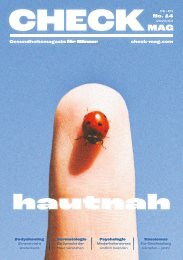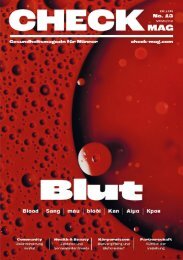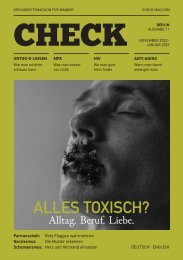CHECK Magazin - Gesundheitsmagazin für Männer No.17
Wer geht nicht mit vollem Kopf zu Bett? Die einen können ihre Tagesgeschäfte im Traum verarbeiten, die anderen liegen wach und grübeln. Manche behelfen sich mit Schlafmitteln, um das nötige Maß an Erholung zu erreichen, schieben damit aber oft die Probleme nur auf die lange Bank. In dieser Ausgabe wollen wir daher genauer hinsehen und fragen: Was macht der Schlaf und wie können wir ihn verbessern?
Wer geht nicht mit vollem Kopf zu Bett? Die einen können ihre Tagesgeschäfte im Traum verarbeiten, die anderen liegen wach und grübeln. Manche behelfen sich mit Schlafmitteln, um das nötige Maß an Erholung zu erreichen, schieben damit aber oft die Probleme nur auf die lange Bank. In dieser Ausgabe wollen wir daher genauer hinsehen und fragen: Was macht der Schlaf und wie können wir ihn verbessern?
Sie wollen auch ein ePaper? Erhöhen Sie die Reichweite Ihrer Titel.
YUMPU macht aus Druck-PDFs automatisch weboptimierte ePaper, die Google liebt.
<strong>CHECK</strong> MAG #17<br />
TICK-BORNE ENCEPHALITIS<br />
(TBE)<br />
Ticks can transmit TBE viruses. The STIKO<br />
(Standing Committee on Vaccination)<br />
therefore recommends vaccination against<br />
TBE as the safest protection against the<br />
disease for all people who are in or live in<br />
TBE risk areas and could be bitten by ticks.<br />
TBE cannot be treated, as the infection<br />
caused by viruses cannot be combated with<br />
antibiotics. It is only possible to alleviate the<br />
symptoms. People who work in forestry,<br />
agriculture or laboratories are particularly<br />
at risk of contracting TBE at work and<br />
should also take precautions.<br />
TBE can cause inflammation of the<br />
brain, meninges, or the spinal cord<br />
Severe courses of the disease occur more<br />
frequently in older adolescents and adults than<br />
in children. TBE occurs mainly in Bavaria,<br />
Baden- Württemberg, southern Hesse, southeastern<br />
Thuringia, Saxony and south-eastern<br />
Brandenburg, as well as in central Hesse, Saarland,<br />
Rhineland-Palatinate, Lower Saxony and North<br />
Rhine-Westphalia. In Brandenburg, the urban<br />
district of Frankfurt (Oder) is also considered<br />
a risk area, as is the Altenburger Land district<br />
in Thuringia.<br />
graphic: ©masullo.de<br />
There are currently 180 districts designated<br />
as TBE risk areas. People aged 40 and over have<br />
a higher risk of contracting TBE and senior citizens<br />
are more susceptible to complications. On average,<br />
two percent of ticks in risk areas are infected<br />
with the TBE virus. If you go on holiday in<br />
Germany, it is therefore worth getting vaccinated<br />
at a specialist or general practitioner’s office,<br />
especially as ticks like warm weather and, as their<br />
distribution shows, have been enjoying the effects<br />
of climate change for some time.<br />
Three vaccinations for basic<br />
immunisation<br />
Depending on the vaccine, the second vaccination<br />
dose is administered 2 weeks to 3 months after<br />
the first vaccination. Most vaccinated people are<br />
protected 14 days later, which is sufficient for the<br />
one season. For longer-lasting protection, a third<br />
vaccination is required after a further 5 to 12 or<br />
9 to 12 months. The specialist or general practitioner<br />
will provide information about possible<br />
vaccination reactions; in the case of a proven severe<br />
allergy to chicken protein, the risks of the TBE<br />
vaccination should be weighed up against<br />
each other. (ts)<br />
Source: www.impfen-info.de<br />
Immunology48
















